BusinessEurope Headlines No. 2018-22
The EU should maintain a clear, rules-based trade policy
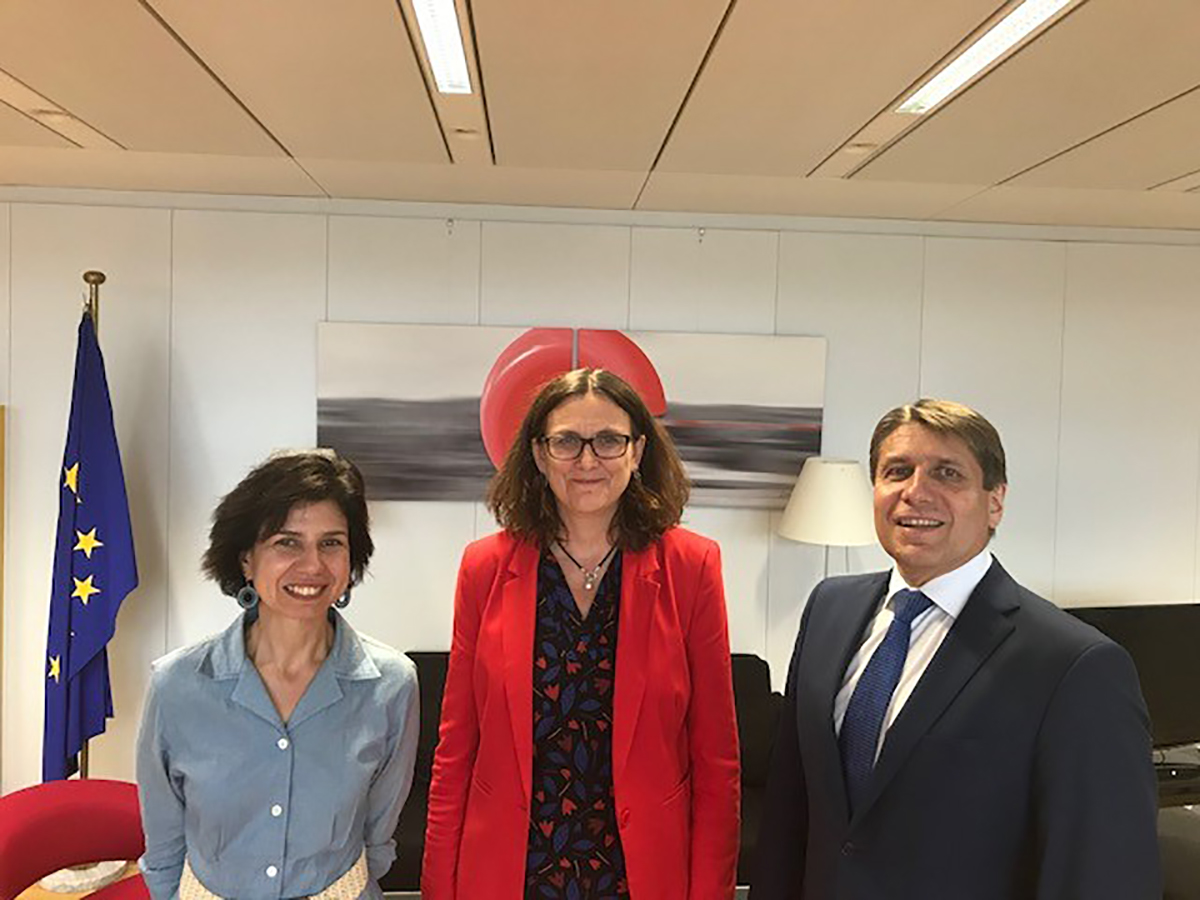
BusinessEurope Director General Markus J. Beyrer and the Director for International Relations Luisa Santos met with European Commissioner for Trade Cecilia Malmström on 14 June in Brussels. In these challenging times for global and European trade policy, BusinessEurope offered its support to the European Commission and urged for an ambitious trade policy agenda at all levels – multilateral and bilateral. The meeting focused on trade relations between the EU, the U.S. and China, as well as the importance of the World Trade Organisation (WTO). BusinessEurope passed a clear message against escalation with the U.S., while the EU rebalancing measures – a response to the adoption of additional tariffs by the U.S. on steel and aluminium – are expected to come into effect next week, but not before 20 June. BusinessEurope also highlighted that the EU should engage with China as a way to address grievances. At the same time, the importance of the trilateral discussions between the EU, the U.S. and Japan, which put on the table issues such as rules on industrial subsidies and technology transfers, was also underlined. Finally, BusinessEurope raised a strong voice in favour of a reformed and effective WTO. Beyrer said: “If we want to deliver more jobs, growth and prosperity for all, we need to safeguard the foundations of fair and rules-based trade policy, under the umbrella of the WTO”. He added that BusinessEurope is convinced of the detrimental effects of unilateral paths, that trade wars must be avoided and the EU should use all available instruments against these scenarios.
Contact: Luisa Santos
Our comment
The Global Fight Against Cybercrime
By Patrick Grant, Adviser, Digital Economy
 As Donald Trump and Kim Jong-Un met this week for that historic summit, a handful of press reporters were permitted to document the event. But as their cameras and microphones pointed towards that historic handshake and press conference, something more covert was happening.
As Donald Trump and Kim Jong-Un met this week for that historic summit, a handful of press reporters were permitted to document the event. But as their cameras and microphones pointed towards that historic handshake and press conference, something more covert was happening.
In the blistering 33 degree heat of Singapore press reporters were naturally given USB-fans depicting the North Korean leaders face on in order to stay cool as they beamed their stories home. While the gifts were not directly attributable to North Korea it certainly raised suspicions. Many remembering the Wannacry attack of 2017 and choosing not to use these gifts. Although North Korea continues to deny a role in any cyberattacks, it is clear to see that cybercrime is becoming a great cause for of global concern.
Cyber-attacks were estimated to cost the global economy around €400 billion a year. In some Member States, half of all crimes committed are cybercrimes. Also, as technology becomes more embedded into society and as connected devices proliferate, the security of these eco-systems have become paramount.
Europe is rightfully committing itself to combat this growing challenge. The European Union’s Cybersecurity Agency (ENISA) is being upgraded to take Member State assistance and coordination more seriously particularly as entire regions rather than single entities are being impacted. The private sector also has a host of knowledge to aid Europe’s fight against cybercrime. From the functioning and design of solutions to the emerging threat landscape in specific sectors, Europe should capitalise on this wealth of information.
This is why business has a pivotal role to play in the creation of the EU-wide cybersecurity certification framework for digital products, services and processes, as announced by the European Commission on 8 June. This will not only raise cybersecurity capacities but ensure citizens trust new technologies. While legislators should continue to set broad policy goals to achieve, it is industry that should lead development on details to achieve them. This will create the critical mass and a successful outreach.
But this is just Europe’s first step in raising cybersecurity capacities. These initiatives would not have protected us from the suspect USB-fans in Singapore nor any other attack from outside of Europe. Our next question will be how to counter foreign state funded industrial espionage. There is no time to stand still.
Contact: Patrick Grant
New publication
Brexit: the customs implications and solutions
 The publication provides a detailed explanation on the various customs implications of Brexit and the solutions that business requires to mitigate the impact on their operations. The analysis addresses a multitude of customs issues related to import and export procedures, processing, transit and regulatory matters.
The publication provides a detailed explanation on the various customs implications of Brexit and the solutions that business requires to mitigate the impact on their operations. The analysis addresses a multitude of customs issues related to import and export procedures, processing, transit and regulatory matters.
Contact: Maurice Fermont
Business in Europe and the U.S. keeping a close dialogue on trade
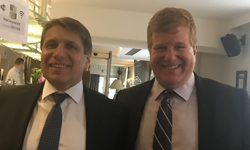 Businesses in Europe and the U.S. need to work together in support of trade and the Transatlantic economy. This was one of the main messages of the meeting between BusinessEurope Director General Markus J. Beyrer and U.S. Chamber Vice-President Myron Brilliant. “Companies in the EU and the U.S. have a strong relation built on open investment and trade. In today’s difficult environment it is even more important that businesses in Europe and the U.S. speak up about the importance of the Transatlantic relation that has been built on trust and mutual benefits”, said Beyrer, adding that closing markets and putting in place additional duties will be detrimental to companies and consumers in both Europe and the U.S. “Europe and the U.S. should be focusing on how to address common challenges and work together to improve international trading rules. Disagreements between us will be exploited by others that do not necessarily share our views on free and fair trade and how markets should function”, Beyrer concluded.
Businesses in Europe and the U.S. need to work together in support of trade and the Transatlantic economy. This was one of the main messages of the meeting between BusinessEurope Director General Markus J. Beyrer and U.S. Chamber Vice-President Myron Brilliant. “Companies in the EU and the U.S. have a strong relation built on open investment and trade. In today’s difficult environment it is even more important that businesses in Europe and the U.S. speak up about the importance of the Transatlantic relation that has been built on trust and mutual benefits”, said Beyrer, adding that closing markets and putting in place additional duties will be detrimental to companies and consumers in both Europe and the U.S. “Europe and the U.S. should be focusing on how to address common challenges and work together to improve international trading rules. Disagreements between us will be exploited by others that do not necessarily share our views on free and fair trade and how markets should function”, Beyrer concluded.
Contact: Luisa Santos
Formalised business channel at UN climate talks crucial for Paris Agreement
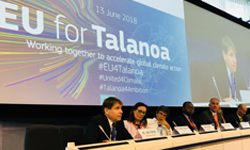 “Global investments in low-carbon technologies need to double to reach the climate goals of the Paris Agreement, but effective frameworks are missing to make this happen”, said BusinessEurope Director General Markus J. Beyrer at the high-level “EU for Talanoa” event in Brussels on 13 June. Negotiating Parties at the UN Climate Change or the United Nations Framework Convention on Climate Change (UNFCCC), he added, need to start agreeing on issues that are crucial to business, such as the rules and procedures to ensure transparency and accountability. Furthermore, “major economies also need to align their climate ambitions as soon as possible to achieve a global level playing field. Finally, setting up a formalised business channel under the UNFCCC can help useful information from business to reach the Parties more effectively during negotiations”. The “EU for Talanoa” dialogue brought together hundreds of high-level stakeholders from governments, business and civil society to prepare the next annual climate conference, namely COP24 that will take place in Katowice, Poland, in December this year. For more information on the formalised business channel, please click here.
“Global investments in low-carbon technologies need to double to reach the climate goals of the Paris Agreement, but effective frameworks are missing to make this happen”, said BusinessEurope Director General Markus J. Beyrer at the high-level “EU for Talanoa” event in Brussels on 13 June. Negotiating Parties at the UN Climate Change or the United Nations Framework Convention on Climate Change (UNFCCC), he added, need to start agreeing on issues that are crucial to business, such as the rules and procedures to ensure transparency and accountability. Furthermore, “major economies also need to align their climate ambitions as soon as possible to achieve a global level playing field. Finally, setting up a formalised business channel under the UNFCCC can help useful information from business to reach the Parties more effectively during negotiations”. The “EU for Talanoa” dialogue brought together hundreds of high-level stakeholders from governments, business and civil society to prepare the next annual climate conference, namely COP24 that will take place in Katowice, Poland, in December this year. For more information on the formalised business channel, please click here.
![]() Contact: Leon de Graaf
Contact: Leon de Graaf
Better teaching of history can help European integration
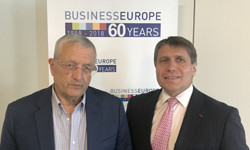 In a meeting with Director General Markus J. Beyrer on 7 June in Brussels, former French Defence Minister Francois Leotard stated that the fact that a truly European narrative is missing ultimately impedes on a stronger “we-feeling” throughout our European Union. That is why his organisation, Pax Europa, headed by the Member of the European Parliament (MEP) Alain Lamassoure, advocates for better teaching of the history of European integration to pupils in all our Member States. In view of the European elections in May 2019, this organisation will try and raise its profile and call for more Europeanisation in our schools.
In a meeting with Director General Markus J. Beyrer on 7 June in Brussels, former French Defence Minister Francois Leotard stated that the fact that a truly European narrative is missing ultimately impedes on a stronger “we-feeling” throughout our European Union. That is why his organisation, Pax Europa, headed by the Member of the European Parliament (MEP) Alain Lamassoure, advocates for better teaching of the history of European integration to pupils in all our Member States. In view of the European elections in May 2019, this organisation will try and raise its profile and call for more Europeanisation in our schools.
Contact: Christian Feustel
European business is vocal in supporting the World Trade Organisation
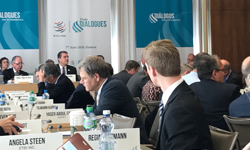 On the occasion of the WTO Trade Dialogue with Business, an annual event that is becoming a tradition, BusinessEurope representatives travelled to Geneva on 7 June to voice their support towards the WTO, which lies at the core of the multilateral trading system. More than 60 representatives from 47 countries joined the discussions on issues that are pertinent to business: e-commerce, investment facilitation, sustainable development and supporting Micro, Small and Medium-sized Enterprises (MSMEs). Commenting on the latter, Luisa Santos, BusinessEurope International Relations Director said: “MSMEs are often more impacted by regulations than larger companies. We should ensure that they are involved in the legislative process from the start and that their needs are taken into account. This requires the establishment of a dialogue not only between business and governments but also between governments." It is in this framework, she added, “we regard the role of WTO as crucial. The WTO and its members, through the discussions that are currently taking place in the Informal Working Group on MSMEs, shall seek to explore multilateral solutions to questions of access to finance, reducing costs for MSMEs, technical assistance and access to markets”. BusinessEurope calls for ambition and the pursuit of tangible results ahead of the next WTO Ministerial Conference, planned to take place in December 2019. While in Geneva, BusinessEurope also had the opportunity to meet and discuss with representatives of WTO members on the broader agenda of the organisation, the state of multilateral trade and ways to overcome current impasses.
On the occasion of the WTO Trade Dialogue with Business, an annual event that is becoming a tradition, BusinessEurope representatives travelled to Geneva on 7 June to voice their support towards the WTO, which lies at the core of the multilateral trading system. More than 60 representatives from 47 countries joined the discussions on issues that are pertinent to business: e-commerce, investment facilitation, sustainable development and supporting Micro, Small and Medium-sized Enterprises (MSMEs). Commenting on the latter, Luisa Santos, BusinessEurope International Relations Director said: “MSMEs are often more impacted by regulations than larger companies. We should ensure that they are involved in the legislative process from the start and that their needs are taken into account. This requires the establishment of a dialogue not only between business and governments but also between governments." It is in this framework, she added, “we regard the role of WTO as crucial. The WTO and its members, through the discussions that are currently taking place in the Informal Working Group on MSMEs, shall seek to explore multilateral solutions to questions of access to finance, reducing costs for MSMEs, technical assistance and access to markets”. BusinessEurope calls for ambition and the pursuit of tangible results ahead of the next WTO Ministerial Conference, planned to take place in December 2019. While in Geneva, BusinessEurope also had the opportunity to meet and discuss with representatives of WTO members on the broader agenda of the organisation, the state of multilateral trade and ways to overcome current impasses.
Contact: Sofia Bournou
EU and Japan working together to address global challenges
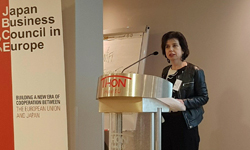 “The upcoming ratification of an ambitious and comprehensive economic partnership agreement between Japan and the EU will deepen our close relationship based on shared values and a strong commitment to rules-based trade, at a time when protectionism is on the rise around the world”, said Luisa Santos, Director for International Relations at BusinessEurope, at the Special Conference of the Japan Business Council in Europe (JBCE) General Assembly on 12 June. After the interventions of Toru Morita, President of the JBCE, and H.E. Kazuo Kodama, Ambassador of the Mission of Japan to the EU, Santos explained the importance of the EU and Japanese business working together in setting modern trade rules through the EU-Japan Economic Partnership Agreement (EPA) while supporting the role of the World Trade Organisation (WTO) and the multilateral trading system. “The EU-Japan EPA brings many benefits for companies in Europe and Japan but we need to make sure these benefits are not eroded in time. A good implementation of the agreement and an effective regulatory cooperation mechanism are key in achieving this objective”, Santos concluded.
“The upcoming ratification of an ambitious and comprehensive economic partnership agreement between Japan and the EU will deepen our close relationship based on shared values and a strong commitment to rules-based trade, at a time when protectionism is on the rise around the world”, said Luisa Santos, Director for International Relations at BusinessEurope, at the Special Conference of the Japan Business Council in Europe (JBCE) General Assembly on 12 June. After the interventions of Toru Morita, President of the JBCE, and H.E. Kazuo Kodama, Ambassador of the Mission of Japan to the EU, Santos explained the importance of the EU and Japanese business working together in setting modern trade rules through the EU-Japan Economic Partnership Agreement (EPA) while supporting the role of the World Trade Organisation (WTO) and the multilateral trading system. “The EU-Japan EPA brings many benefits for companies in Europe and Japan but we need to make sure these benefits are not eroded in time. A good implementation of the agreement and an effective regulatory cooperation mechanism are key in achieving this objective”, Santos concluded.
Contact: Maurice Fermont
Work-life balance policies should focus on increasing women’s employment participation
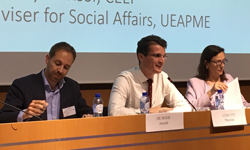 Increasing women’s employment participation has the potential of adding 370 billion euros to the EU GDP. Improved women’s employment participation is also essential to reduce labour market gender segregation and the gender pay gap. These were the main messages given by Social Affairs Director Maxime Cerutti at the European social partners seminar on “Tackling the gender pay gap and promoting childcare” held in Brussels on 12 June. He added: “The EU should do more to support Member States efforts to increase and improve investment in childcare infrastructure. The new multiannual financial framework, in particular InvestEU and the European Social Fund ESF+ have an important role in supporting the European semester policy coordination and foster investments in childcare at national, regional and local levels."
Increasing women’s employment participation has the potential of adding 370 billion euros to the EU GDP. Improved women’s employment participation is also essential to reduce labour market gender segregation and the gender pay gap. These were the main messages given by Social Affairs Director Maxime Cerutti at the European social partners seminar on “Tackling the gender pay gap and promoting childcare” held in Brussels on 12 June. He added: “The EU should do more to support Member States efforts to increase and improve investment in childcare infrastructure. The new multiannual financial framework, in particular InvestEU and the European Social Fund ESF+ have an important role in supporting the European semester policy coordination and foster investments in childcare at national, regional and local levels."
Contact Guillaume Cravero
Standardisation: industry concerned about the functioning of the New Approach
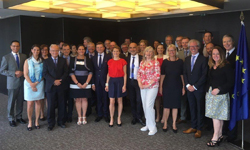 During a high-level interinstitutional dialogue on European standardisation taking place on 7 June, Paul Coebergh van den Braak, Chair of BusinessEurope’s Free Movement of Goods Working Group, expressed industry’s concerns with the functioning of the New Approach to technical harmonisation. "BusinessEurope does not see the need for a discussion on the priorities of European standardisation during today’s meeting, as there are more fundamental issues that need to be addressed first", said Mr Coebergh Van Den Braak. "The New Approach has demonstrated to be a very valuable and effective regulatory style and a competitive asset for the EU. However, in the last decade we have seen a strong politicisation of standardisation, and an adverse shift of the implementation of the New Approach that is de-facto invalidating it." He called for a discussion at high political level with industry on the role of standards in the Single Market.
During a high-level interinstitutional dialogue on European standardisation taking place on 7 June, Paul Coebergh van den Braak, Chair of BusinessEurope’s Free Movement of Goods Working Group, expressed industry’s concerns with the functioning of the New Approach to technical harmonisation. "BusinessEurope does not see the need for a discussion on the priorities of European standardisation during today’s meeting, as there are more fundamental issues that need to be addressed first", said Mr Coebergh Van Den Braak. "The New Approach has demonstrated to be a very valuable and effective regulatory style and a competitive asset for the EU. However, in the last decade we have seen a strong politicisation of standardisation, and an adverse shift of the implementation of the New Approach that is de-facto invalidating it." He called for a discussion at high political level with industry on the role of standards in the Single Market.
![]() Contact: Basje Bender
Contact: Basje Bender
Economic and Monetary Affairs Committee discusses EMU with Commission representative
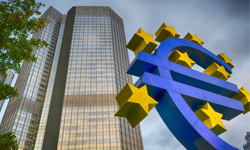 BusinessEurope’s Economic and Monetary Affairs committee (ECFIN) welcomed to its meeting on 7 June Fabien Dell, Member of Cabinet of European Commissioner for Economic and Financial Affairs, Taxation and Customs, Pierre Moscovici. The group discussed, amongst other issues, the European Commission’s work on deepening the Economic and Monetary Union (EMU), which following the Commission’s 6 December package, reaches a vital stage with the upcoming Euro Summit on 28-29 June. Following Dell’s presentation, the group discussed the importance and urgency business places on deepening EMU, with priority issues including the completion of the banking union, and the establishment of a stabilisation function.
BusinessEurope’s Economic and Monetary Affairs committee (ECFIN) welcomed to its meeting on 7 June Fabien Dell, Member of Cabinet of European Commissioner for Economic and Financial Affairs, Taxation and Customs, Pierre Moscovici. The group discussed, amongst other issues, the European Commission’s work on deepening the Economic and Monetary Union (EMU), which following the Commission’s 6 December package, reaches a vital stage with the upcoming Euro Summit on 28-29 June. Following Dell’s presentation, the group discussed the importance and urgency business places on deepening EMU, with priority issues including the completion of the banking union, and the establishment of a stabilisation function.
Contact: Frederik Lange
Challenges to mutual recognition in the Single Market
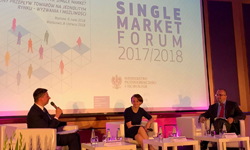 Speaking on the free movement of goods at the Single Market Forum in Warsaw on 8 June, BusinessEurope Director for Internal Market Department Martynas Barysas stressed: “it is essential that the legitimate public interest grounds that can be used to deny mutual recognition will become better defined, and that adequate problem-solving tools are available to companies when mutual recognition is denied. We see that in the discussions in the European Parliament the basic principle of mutual recognition is questioned by some MEPs, and this is a cause for concern." While the panel focused on mutual recognition and the main challenges in this area, Barysas also stated that authorities should maintain a good balance of enforcement priorities between harmonised and non-harmonised products, and that the Commission’s proposal on market surveillance is of key importance for business.
Speaking on the free movement of goods at the Single Market Forum in Warsaw on 8 June, BusinessEurope Director for Internal Market Department Martynas Barysas stressed: “it is essential that the legitimate public interest grounds that can be used to deny mutual recognition will become better defined, and that adequate problem-solving tools are available to companies when mutual recognition is denied. We see that in the discussions in the European Parliament the basic principle of mutual recognition is questioned by some MEPs, and this is a cause for concern." While the panel focused on mutual recognition and the main challenges in this area, Barysas also stated that authorities should maintain a good balance of enforcement priorities between harmonised and non-harmonised products, and that the Commission’s proposal on market surveillance is of key importance for business.
![]() Contact: Basje Bender
Contact: Basje Bender
The Product Liability Directive is fit for purpose
 The Product Liability Directive is fit for purpose and in the view of industry it should not be revised. This was the main message that BusinessEurope Adviser Basje Bender expressed in the first meeting of the expert group on product liability and new technologies in Brussels on 8 June. In the view of BusinessEurope, any future guidance should be developed on a case-by-case approach in specific areas, and only where there are proven difficulties with the application of the Directive. BusinessEurope participated in the consultation on the Product Liability Directive that took place last year. On the basis of this consultation, the European Commission has decided not to revise the Directive but rather provide guidance, either horizontal or sectoral, on its application. The expert group, which operates in a “New Technologies” formation and a “Product Liability” formation, will assist the Commission in this exercise. BusinessEurope is part of the product liability formation.
The Product Liability Directive is fit for purpose and in the view of industry it should not be revised. This was the main message that BusinessEurope Adviser Basje Bender expressed in the first meeting of the expert group on product liability and new technologies in Brussels on 8 June. In the view of BusinessEurope, any future guidance should be developed on a case-by-case approach in specific areas, and only where there are proven difficulties with the application of the Directive. BusinessEurope participated in the consultation on the Product Liability Directive that took place last year. On the basis of this consultation, the European Commission has decided not to revise the Directive but rather provide guidance, either horizontal or sectoral, on its application. The expert group, which operates in a “New Technologies” formation and a “Product Liability” formation, will assist the Commission in this exercise. BusinessEurope is part of the product liability formation.
![]()
![]() Contact: Basje Bender
Contact: Basje Bender
Calendar
- 22 June: BusinessEurope publishes Economic Outlook
- 27 June: Conference on the EU pillar of social rights
- 28-29: European Council
- 29 June: EU company law "upgraded" package: making the best of digital solutions and cross-border mobility
Reminder: please take a look at our revised privacy policy